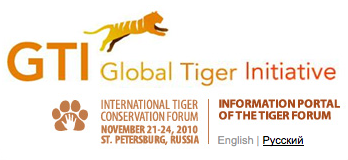 24 November 2010: In an historic effort to save tigers from extinction, 13 Government representatives meeting at the International Tiger Conservation Forum endorsed the St. Petersburg Declaration and agreed to double tiger numbers by 2022.
24 November 2010: In an historic effort to save tigers from extinction, 13 Government representatives meeting at the International Tiger Conservation Forum endorsed the St. Petersburg Declaration and agreed to double tiger numbers by 2022.
The International Tiger Conservation Forum, which was hosted by Russian Federation Prime Minister Vladimir Putin and World Bank President Robert Zoellick, took place from 21-24 November 2010, in St. Petersburg, Russia. Bangladesh, Bhutan, Cambodia, China, India, Indonesia, Laos, Malaysia, Myanmar, Nepal, Russia, Thailand and Viet Nam are the tiger range countries that committed towards implementing the Global Tiger Recovery Program, the strategic plan envisaged by the St. Petersburg Declaration. Deliberations regarding the development of an institutional structure to implement the aims and objectives of the Declaration and its Recovery Program are also underway.
The 13 countries have agreed to strengthen international collaboration, improve scientific monitoring to help restore the species’ habitats and transboundary corridors, and halt poaching and illegal trade of tigers and tiger products. The Recovery Program underscores the importance of creating incentives for local people to protect tigers and strengthening wildlife law enforcement and legislation in order to achieve the St. Petersburg targets. The program also foresees the involvement of local people in biodiversity protection in an effort to reduce conflicts occurring between tigers and local communities.
Speaking at the Forum, Zoellick announced that the World Bank, through its International Development Association (IDA), hoped to provide US$100 million to save the wild tiger by supporting wildlife habitat protection and stopping the illegal trade in tiger body parts. The Bank’s support would amount to almost one-third down payment on the US$350 million that the Global Tiger Recovery Program is estimated to cost. The balance will be sought from governments and other International Financial Institutions.
In an article published in The Guardian, Zoellick stresses that the crisis facing tigers overwhelms local capabilities and transcends national boundaries. Noting that saving tigers is a global challenge, he calls for a partnership of national governments and organizations “pooling their expertise and passion.” Ahmed Djoghlaf, Executive Secretary of the Convention on Biological Diversity (CBD), drew attention to the CBD new Strategic Plan, including targets to: at least halve and where feasible bring close to zero the rate of loss of natural habitats including forests; place 17% of terrestrial and inland water areas under protection; and restore at least 15% of degraded areas. Elizabeth Maruma Mrema, Executive Secretary of the Convention on Migratory Species (CMS), underlined the importance of safeguarding international migration corridors and trans-border habitats. She emphasized that the CMS “is unique in that it can provide a framework to protect not only the animal, but also its habitat.”[UNEP Press Release][Zoellick’s Article][Djoghlaf’s Statement][Tiger Forum Website] [World Bank Press Release] [CMS Press Release]